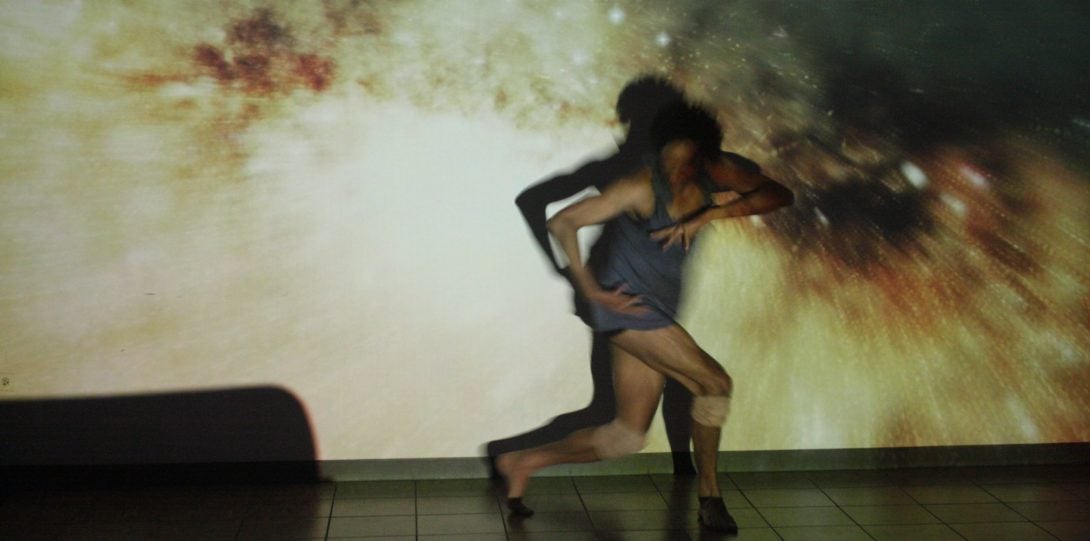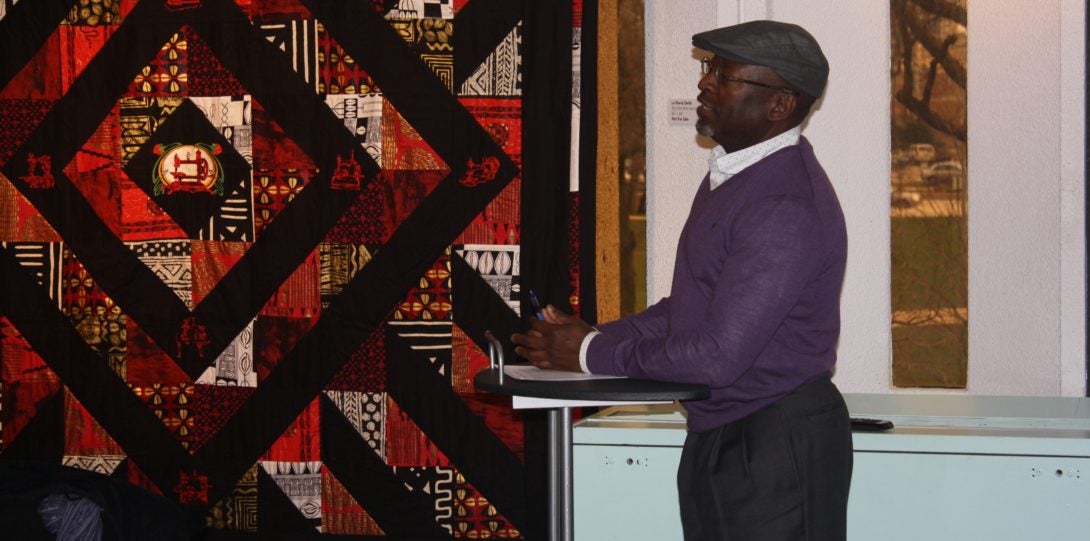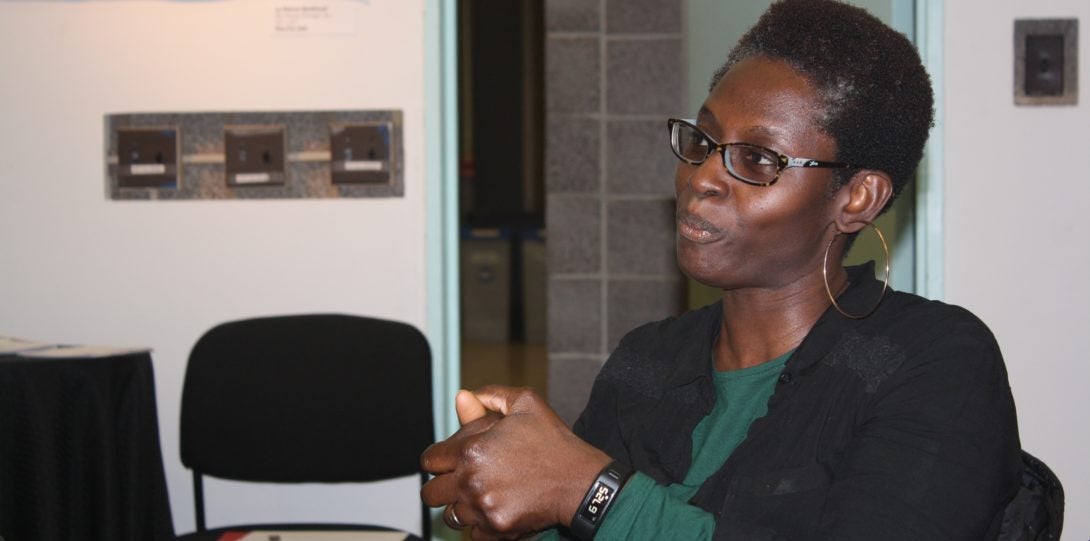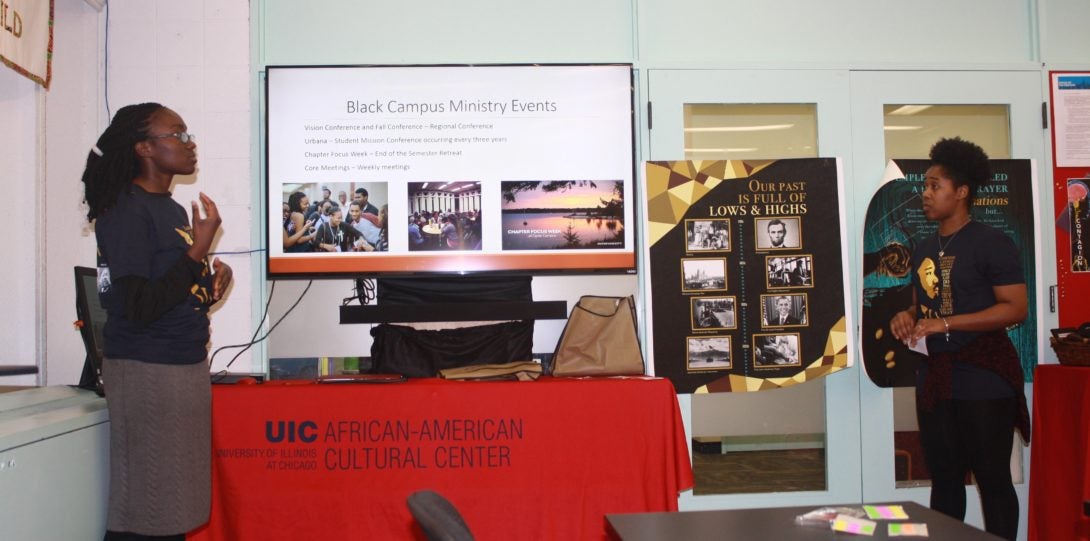Possessing Remedies
Possessing Remedies: Restorative Performance Practices in Black and Brown Communities
April 6, 2017, 11 am – 7pm/ AACC Gallery/ UIC Gallery 400
Activism. Alternative solutions. Creativity. Counteraction. Interconnection. Inclusion. Heritage. Legacy. Meditation. Nourishment. Prayer. Reflection. Rehabilitation. Restorative Justice. Self-care. Testimony. Treatment. Witnessing. The African-American Cultural Center (AACC) at the University of Illinois at Chicago convenes international scholars, artists, activists, and participants to think through the following questions that the word “remedy” invokes:
- What are healthy and extra-scientific actions that draw strength from resources our bodies have acquired through intergenerational transfer of knowledge?
- How do we place value on labor that crafts a more affirming and empowering present?
- What knowledge, skills and abilities will aid us in sharpening our vision to creatively frame and sustain the well being of future generations?
- How does our experiences inform our ways of creating communal healing practices?
The AACC’s 2016-2017 “Year of Remedies” programming concludes with the symposium: “Possessing Remedies: Restorative Performance Practices in Black and Brown Communities” to open up an inclusive and interdisciplinary and inclusive space for UIC’s multiple stakeholders and allies—both academic and community—to gather, share and critique strategies and interventions that Black and Brown communities have developed to sustain and heal themselves.
- What are healthy and extra-scientific actions that draw strength from resources our bodies have acquired through intergenerational transfer of knowledge?
- How do we place value on labor that crafts a more affirming and empowering present?
- What knowledge, skills and abilities will aid us in sharpening our vision to creatively frame and sustain the well being of future generations?
- How does our experiences inform our ways of creating communal healing practices?
The AACC’s 2016-2017 “Year of Remedies” programming concludes with the symposium: “Possessing Remedies: Restorative Performance Practices in Black and Brown Communities” to open up an inclusive and interdisciplinary and inclusive space for UIC’s multiple stakeholders and allies—both academic and community—to gather, share and critique strategies and interventions that Black and Brown communities have developed to sustain and heal themselves.
UIC AFRICAN-AMERICAN CULTURAL CENTER
830 SOUTH HALSTED, SECOND FLOOR
10:30am – 11am: Welcome & continental breakfast
11am – 12:30pm: Opening remarks
- Mario LaMothe, African-American Cultural Center/UIC
Session 1: Invocations and/in the City
This session serves as a point of entry into discussion of spiritual and or religious culture and its role in convening and opening up spaces for healing and restoration.
- “Everyday Use: Remedies (love, unity, peace)” –– Dr. Lori Baptista, African-American Cultural Center/UIC
- “Afro-Curative Arts and the Legacy of Katherine Dunham”–– Dr. Johari Jabir, African American Studies/UIC
- “Ways of Healing: Locating Ritual and Calling on Spirit in the Works of Honey Pot Performance”–– Meida Teresa McNeal, Honey Pot Performance
Facilitator: Aja D. Reynolds, doctoral student scholar in the Department of Educational Policy Studies at UIC
1pm – 2:30pm: Session 2: Collaborative Healing Practices
Session 2 offers an opportunity for researcher-practitioners to share aspects of their work that focus on how particular communities draw from cultural forms and practices (or address cultural biases, stigmas) to promote healing.
- “UIC Integrated PASEO: A Campus-Community Partnership to Address the risks of HIV/AIDS, Hepatitis C, Mental Health and Substance Use among young adults in Chicago” –– Dr. Rohan D. Jeremiah, Community Health Sciences/UIC
- “Stitching Together: Trans* Haitian Practices of Self-Authorization after the 2010 Earthquake” –– Dr. Erin Durban-Albrecht/Illinois State University
- “Humor and Healing: Trauma and the Work of Laughter in the Performances of Jackie “Moms” Mabley” –– Dr. Cynthia Blair, UIC African American Studies and History
Facilitator: Devin Malone, Master’s student in Museum and Exhibition Studies at UIC
2:30pm – 3:30pm: Session 3: Religion and Remedies
This session engages how members of black and brown communities affirm or heal themselves in declarative ways, through Biblical scriptures.
- A dialogue with InterVarsity Black Campus Ministry at UIC
3:30pm: Meal Break
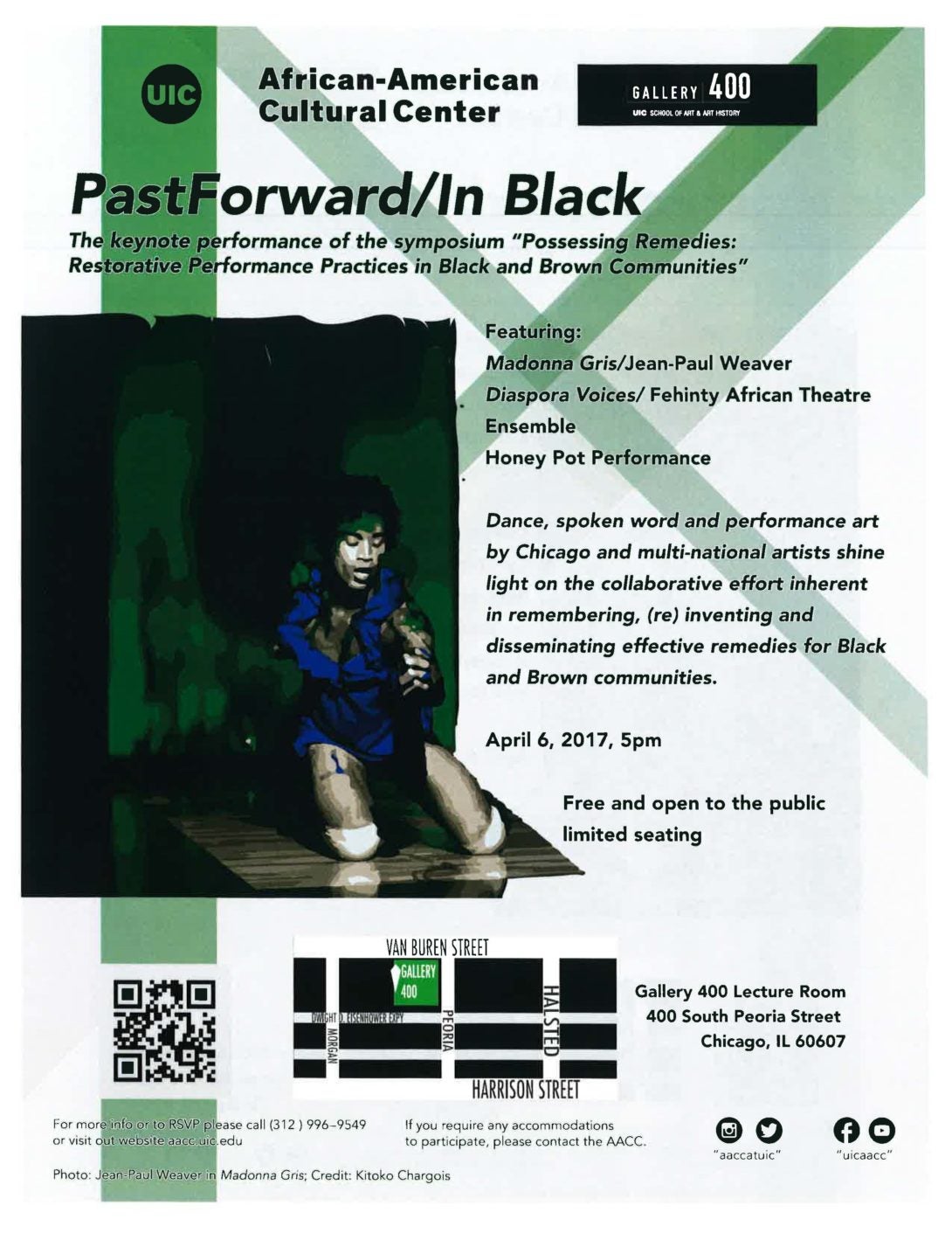
UIC GALLERY 400, LECTURE ROOM
400 SOUTH PEORIA STREET
5pm: Keynote Performance
PastForward/In Black:
- Madonna Gris / Jean-Paul Weaver (Haitian-American Dance Artist)
- Diaspora Monologues / Fehinty African Theatre Ensemble
- ways of knowing / Honey Pot Performance
Community reflection, closing remarks and reception to follow
Abstracts and Biographies
(in order of presentation)
- “Everyday Use: Remedies (love, unity, peace)” –– Dr. Lori Barcliff Baptista
Abstract: How do members of diverse geographic and ethnic communities harness aspects of material and expressive culture to negotiate their relationships with particular places, histories, traditions and concerns? Anchored in a participatory action research approach and collaboration with Chicago fabric artist Jim S. Smoote II, this presentation critically engages the dialogic potential of objects of daily life to foster communication between various cultural groups. I illustrate our efforts to channel the affective power of the iconography of remedies and African-American quilting traditions and practices to drive a broader agenda for change, growth and transformation.
Lori Barcliff Baptista, PhD., directs the African-American Cultural Center at the University of Illinois – Chicago and holds faculty appointments in the School of Theatre & Music, the graduate program in Museum and Exhibition Studies and Honors College. Her research, teaching and creative work focus on the relationships between material and expressive culture, identity performances and pressing social and environmental justice issues. Her current book project: Being Useful: Participatory Action Research, Place making and Social Practice critically assesses the aesthetics, affect and efficacy of mounting collaborative exhibitions and creative projects as a method for conducting and disseminating research. Her research is featured in a number of working papers, peer-‐reviewed journals such as Text and Performance Quarterly, and the University of Massachusetts-‐Dartmouth edited volume, Fashioning Ethnic Culture: Portuguese––American Communities Along the Eastern Seaboard. She may be contacted at Baptista@uic.edu
- “Afro-Curative Arts and the Legacy of Katherine Dunham” –– Dr. Johari Jabir
Abstract: Katherine Dunham was an internationally known dancer, choreographer, and pedagogue who trained several prominent figures in modern American dance. Dunham’s legacy is widely referenced in dance studies, performance studies, and diaspora studies, and her initiation as a priestess in Haitian Vodou is well known. My comments will reconsider the social/historical context of Dunham’s work in E. St. Louis, IL., as an example of Afro-curative practice of the arts in Black diasporic communities. Dunham learned how to “conjure” the spirit in her studies of Haitian dance but she also learned a critical element in Haitian Vodou and the arts: how to serve the spirits by serving one’s community. When Dunham arrived in E. St. Louis, IL in the mid 1960s the city was in the throes of a decay that had began in the 1950s. Drawing from the work of Haitian scholar Claudine Michel, I will theorize the spiritual and healing work of the arts in Haitian Vodou as an important part of Dunham’s legacy in E. St. Louis, IL. Dunham’s legacy is our lesson. Amid the nation’s push toward a STEM curriculum void of the arts, it is imperative that Black communities reclaim the spiritual work of the arts as a remedy against the poisonous alienation and segregation that plague’s U.S. society.
Johari Jabir is an artist/scholar/teacher. A native of St. Louis, Missouri, he was educated in the St. Louis public school system. Johari began his study of music at a very young age and was stepped in the St. Louis school of gospel blues led by Willie Mae Ford Smith and Rev. Cleophus Robinson. He continued his study of music at Fontbonne College (now Fontbonne University) where he received a B/A in music. After an extensive professional career in church music and musical theatre, he attend the Pacific School of Religion in Berkeley, CA where he received an Mdiv. During his PhD work at the University of California Santa Barbara Johari crafted the intellectual aspect of his artistic work. His teaching, scholarship, and musical performance are all part of an organic project of music, history, teaching and learning about the Black diasporic experience. His first book, Conjuring Freedom: Music and Masculinity in the Civil War’s “gospel Army” analyzes the songs of the 1st South Carolina Volunteers, a regiment of Black singing soldiers who met nightly in the performance of the ring shout.
- “Ways of Healing: Locating Ritual and Calling on Spirit in the Works of Honey Pot Performance –– Dr. Meida Teresa McNeal
Abstract: This presentation considers gestures to ancestral knowledge and spirit’s presence that flow through the creative works of long time collaborative Honey Pot Performance. Musing over HPP’s collaborative methods and modes of convening with communities, I contemplate how fellowship, vulnerability, healing, and activation become powerful spirit tools to address the everyday challenges we face as women and communities of color.
Meida Teresa McNeal is an independent Artist and Scholar of performance studies, dance and critical ethnography. McNeal is Artistic and Managing Director of Honey Pot Performance. Meida also works with the Chicago Park District as Arts & Culture Manager supporting arts and culture partnerships and programming initiatives across the city’s parks and cultural centers.
- “UIC Integrated PASEO: A Campus-Community Partnership to Address the risks of HIV/AIDS, Hepatitis C, Mental Health and Substance Use among young adults in Chicago” –– Dr. Rohan D. Jeremiah
Abstract: UIC School of Public Health, in collaboration with the Puerto Rican Cultural Center-Vida/SIDA, has established a campus-community partnership, UIC Integrated PASEO (Promoting Actions that support prevention and recovery through Services, Education, and Outreach), to co-locate substance abuse, mental health, viral hepatitis, and HIV prevention and care services for Latino/Hispanic and African American young adults on campus and in surrounding campus communities. Emerging themes from our community health needs assessment reflect a myriad of unique issues at the intersections of Race/Ethnicity and LGBTQ health including access to comprehensive LGBT health services staffed by culturally competent health professionals; recognition and support for individuals that maintain their HIV-negative status; housing and employment challenges; and limited knowledge and awareness about the risks of Hepatitis C. UIC Integrated PASEO’s community health need assessment activities have revealed ways to improve the health and well-being of LGBTQ young adults at the individual, interpersonal, organizational and policy levels.
Dr. Rohan D. Jeremiah, MPH is an Assistant Professor of Community Health Sciences at UIC School of Public Health. He is a global public health researcher with expertise in Medical Anthropology and Health Education. His research is at the intersections of Trauma; HIV/AIDS and Substance Use reflecting how Racial/Ethnic/Gender-related health disparities impact vulnerable and underserved populations.
- “Stitching Together: Trans* Haitian Practices of Self-Authorization after the 2010 Earthquake” – Dr. Erin L. Durban Albrecht
Abstract: Based on multi-sited ethnographic research with trani, trans, and transgender Haitians, this paper focuses in on how one trans woman—“Kelly”— has built a life after the devastation of the 7.0 earthquake on January 12, 2010. The earthquake is the most prominent transition in Haitian transgender lives because of the ways that it reorganized bodies and social relations, processes that I refer collectively to as breaking open. I draw from black, queer, trans*, and crip theories to consider how Kelly’s life herstory creates possibilities for elaborating the effects of breaking open, as well as healing in the form of stitching together. In this postcolonial context of disablement, stitching together the body and social life is a way of performing black trans* self-authorization when restoration may not be possible.
Erin L. Durban-Albrecht is an assistant professor of women’s & gender studies and anthropology at Illinois State University. Erin’s scholarship about the gender and sexual politics of U.S. imperialism in Haiti won the American Studies Association Ralph Henry Gabriel Dissertation Prize and the National Women’s Studies Association—University of Illinois Press First Book Prize.
- “Humor and Healing: Trauma and the Work of Laughter in the Performances of Jackie “Moms” Mabley”
Abstract: Jackie “Moms” Mabley was a performer whose career in comedy spanned over 60 years – from minstrel theater and tent shows for black audiences in the early 20th century to huge crossover success through comedy recordings and television appearances in the 1960s and ‘70s. Jackie “Moms” Mabley cultivated and mastered several incongruities: a toothless, disheveled old bag lady certain of her own prowess and sexual allure; a lesbian who on stage boldly expressed preference for the company of virile, young men; a female comedian who dared to speak of black women’s sexual desire in an arena rarely forgiving women assertive enough to claim their own bodies and pleasures; a black woman whose life in public concealed the closely protected details of her private life. In this presentation, I will consider the ways that Jackie Mabley’s humor and her comedic dissemblance reflected the preoccupations as well as the changing racial, gender, and sexual politics of her times. I will explore the ways that personal and racial trauma shaped her humor, and discuss the ways that her stage character – developed over several decades – gave voice and release to her growing audience, forging a community of healing.
Cynthia Blair is Associate Professor of African American Studies and History at UIC and studies the intersection of race and sexuality in American society. Her first book, I’ve Got to Make My Livin’: Black Women’s Sex Work in Turn-of-the-Century Chicago, explores African American women’s sex work in Chicago during the decades of some of the city’s most explosive growth, expanding not just our view of prostitution, but also of black women’s labor, the Great Migration, the emergence of modern sexuality, and the criminalization of Black women in the early twentieth century city. The book won the Lora Romero Book Prize awarded by the American Studies Association to the best-published first book in American Studies that highlights the intersections of race with gender, class, sexuality and/or nation. She is currently at work on a cultural biography of the black comedian Jackie “Moms” Mabley.
- A Dialogue with InterVarsity Black Campus Ministry at UIC
InterVarsity Black Campus Ministry at UIC is a chapter of Black Campus Ministries, which is committed to reaching black students and faculty at majority institutions and historically black colleges/universities nationwide, ministering to the unique needs of the community and laboring to develop extraordinary Black Christian leaders and world changers. Through our growing campus ministries, involvement in global and urban missions, through our pursuit of God in our fields of study and research, we hope to see the name of Christ spread and exalted among the these young people who will become the next leaders of our communities and beyond.
Keynote Performance: PastForward / In Black
- Madonna Gris / Jean-Paul Weaver
- Diaspora Monologues / Fehinty African Theatre Ensemble
- ways of knowing / Honey Pot Performance
Running time: Approximately 90 minutes with two brief pauses, followed by a discussion with the artists
Madonna Gris is the documentation of the ancestral dreams and genetic memories of Queer Millennial Haitian-American dance artist Jean-Paul Weaver. The advent of the Internet has created a rainbow bridge to the memories of our ancestors and brought their existence to a realm of light. As our understanding of the digital world expands we are able to see the Loa (spirit/energy) of our ancestors in a new light. With offerings of electricity and Wi-Fi we are embarking on a new journey into the mouth of the rainbow serpent. Madonna Gris honors three female Loa of Haitian Vodou. Erzulie Freda, the white female Loa of love, luxury, luck, cleanliness and beauty. Erzulie Danto, The black female Loa of queerness, love, jealousy, dance, protector of abused woman, children, and queer people. Ayida Wedo the female Rainbow serpent Loa of healing, fertility, creation, and cosmic connection.
Jean-Paul Weaver is an artist based out of Pittsburgh, PA. He holds an A.A. in Theatre and Dance from Casper College and trained at Alonzo King’s Lines Ballet Training Program. He has worked with choreographers Christian Burns, Kathleen Hermesdorf, LeeWei Chao, Kara Davis, Micheal Velez, Elizabeth Castineda, Cleo Parker Robinson, Kemba Shannon, Camille A. Brown, Nijawwon Matthews, and Gustavo Ramirez Sansano. Company credits include Deeply Rooted Dance Theater II, Elements Contemporary Ballet, Luna Negra Dance Theatre (apprentice), Polaris Dance Theatre, Anthony Williams Dance Project, Texture Contemporary Ballet, Shanna Simons Dance, and Staycee Pearl Dance Project. He has presented his own work at the Kelly Strayhorn Theater’s newMoves Contemporary Dance Festival and on Texture Contemporary Ballet.
Diaspora Monologues: America as a tapestry of identities, a diasporic conglomerate is tensely pulled and loosely woven; Diaspora Monologues is an annual performance collection that shares compelling stories of crossing national, racial, and cultural borders as we encounter one another in this space. The 2017 monologues presenting the narratives of Chicago community members along with a staged reading of the novel, Americanah by Chimamanda Adichie explores the contours of contemporary African migration through love, loss, and transformation.
Fehinty African Theatre Ensemble’s belief that performance illuminates our many trajectories as well as our common humanity is at the heart of our mission to stage creative works from Africa and its Diasporas. We value a process that actively engages African communities, facilitates the development of emerging artists and fosters cross-cultural dialogue and creative exchanges with other arts, cultural and community groups.
ways of knowing (work in progress) by Honey Pot Performance; collaborators/performers: Abra Johnson, Meida McNeal, Jo de Presser
A meditation on the value and alchemy of a practice, ways of knowing invites the public into the hybrid art making practice of long time multidisciplinary creative collaborative Honey Pot Performance. What is the craft of our creative process? What are our rituals, our come back to’s, our ways of sitting deep in our collective practice of making together? And how do we establish value for the kind of work we do and care about? In ways of knowing, HPP digs in to explore concepts of mastery, expertise, and value using the ensemble’s own evolving creative process as a center to build new work. What is “mastery” or “expertise”? How do we display power when even our discriminate usage of these terms reveals troublesome patterns, often leaving a surplus of valuable “other” ways of knowing to the wayside? And yet, mastery or expertise can also indicate the joy and magic of states of flow, of a meditative and intimate familiarity with a particular way of knowing. Which notions of mastery come to predominate the conversation and which are sidelined? On which criteria can we meet halfway? Which claims become our common ground?
Honey Pot Performance (HPP) is a feminist creative collaborative. Since 2001, HPP members have cultivated an approach to performance integrating movement, theater, and first-voice to examine the nuanced ways people negotiate identity, belonging and difference in their lives and cultural memberships.
Special thanks to: Brenda Pinkett-Little, Sandra Muñoz, T’yanna Moore, Emmanuella Ben-Eboh, UIC Dept. of African-American Studies, Devin Malone, Aja D. Reynolds, UIC Center for Student Involvement & Joy Roniciel Vergara and Sharmayne Harrington, UIC Gallery 400 & Demecina Beehn, UIC Campus Housing & Nick Ardinger, and guest presenters, artists and performance groups.
